The spirit of Logan Lore: The Wānaka couple finding resilience, mental strength and purpose through outdoor adventures
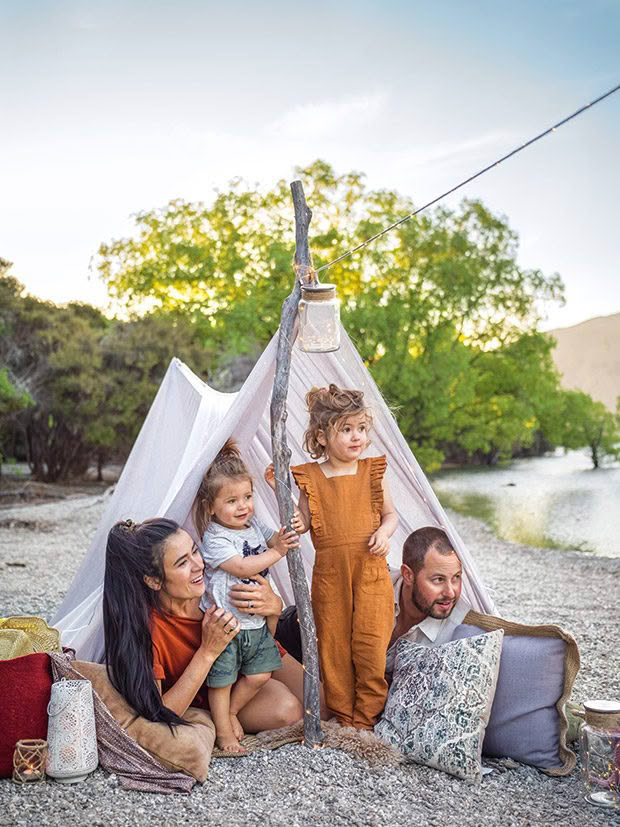
Ben Logan and Bel Jones, with their toddlers, Archer Wolf and Zahara, featured on the January/February 2021 issue of NZ Life & Leisure.
Helping people to find their “why” is the life purpose of a Wānaka-based couple who find answers in the mountains.
Words: Kate Coughlan Photos: Rachael McKenna
It is a conundrum that never has humanity had it so good yet never has the species been so lost. In evolutionary terms, says Ben Logan, modern man has it made. Hot and cold running water, abundant food, few physical threats (pandemic notwithstanding) and comfortable shelters.
Imagine the envy of early homo sapiens should she or he be time-warped through the past 70,000 years which, in an evolutionary timeline, is but a blink of an eye. Seeing their descendants today would raise a hairy eyebrow for sure.
So why it is, wonders Wānaka-based Ben, that chronic disease and depression are so prevalent? How can it be that amid so much food, people are nutritionally challenged? How is it that the superabundant communication of the digital era leaves many isolated and lonely?
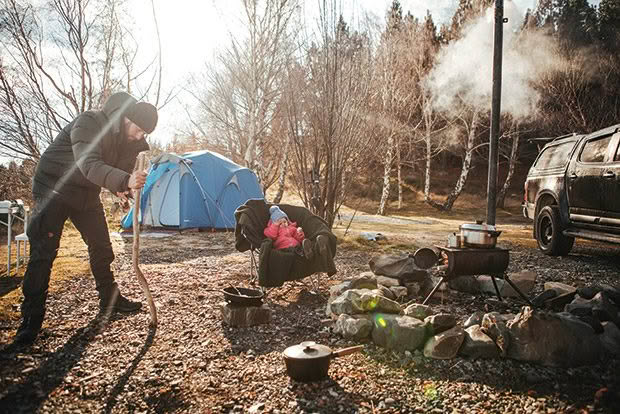
Ben and Bel usually sleep in the blue-domed tent on inflatable ground mattresses, taking a child each in a pair of sleeping bags zipped to make a double. The children are accustomed to and quite happy sleeping in tents. Cooking is done over a cast-iron fire in this camping site near Lake Pūkaki.
“We are the only species confused about what we are supposed to eat,” says Ben, who left hometown Auckland in his 20s for the mountains of Wānaka, seeking inspiration for a training regime as a professional triathlete.
“We argue about whether we should be vegan or dairy-free and wonder whether our bodies are gluten-intolerant. An instinctive knowledge of nutrition is lost to us. And we are highly confused about what we should do with our lives and even wonder if there is a purpose in being here at all.”
Bel Jones left Melbourne in her 20s for a ski holiday on the slopes of Mt Ruapehu and never wanted to leave. Like many creative and outdoors-oriented young people, she gravitated south to the more plentiful mountains of Wānaka, where she pursued photography and filmmaking.
She agrees with Ben, now her husband, that many people are lost. “If you speak to them about the fundamentals, they have no idea of what their life purpose is, or even what they are supposed to be doing with their time.”
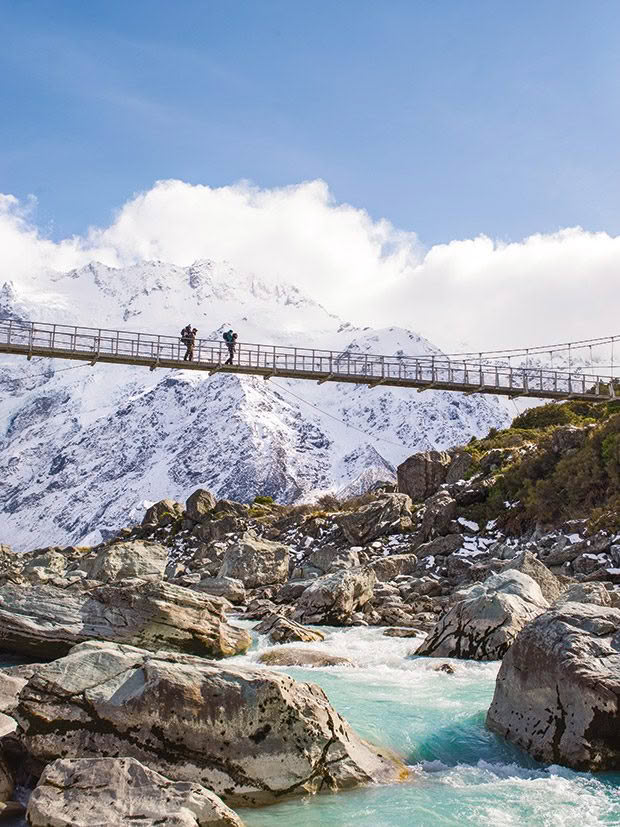
The Hooker Valley Track in Aoraki/Mount Cook National Park crosses the Hooker River via a suspension bridge. The toddlers are happy enjoying unobstructed views of Aoraki/Mount Cook from their parents’ backpacks. “Snacks,” says Bels. “Are toddlers hollow? Always take more than you think you’ll need.”
Ben, an avid amateur student of psychology (initially to sharpen his training regime), began thinking about how inputs could shape life’s outcomes in the same way an athlete trains the body for a race. After meeting Bel, he decided to teach himself to be the best man he could be.
Then, at 26 and the height of his fitness and elite triathlete career, he developed epilepsy. “I’d had quite a lot of head injuries and concussions when I was younger, and even though there are still a lot of unknowns about what causes this adult-onset epilepsy, it is thought it might have developed from that.”
Ben’s childhood, sadly, included 10 years with a physically abusive stepfather, during which more than one birthday was spent in a women’s refuge. Sport, as a career, was suddenly out of the question as the stress of training made his epilepsy worse.
“Medication would have worked to control the seizures, but the pharmaceutical approach wasn’t where I wanted to go. It can have negative side effects on some people. I made pretty big plans to heal myself; studied a lot of science and saw that I could do plenty with nutrition and other practices.”
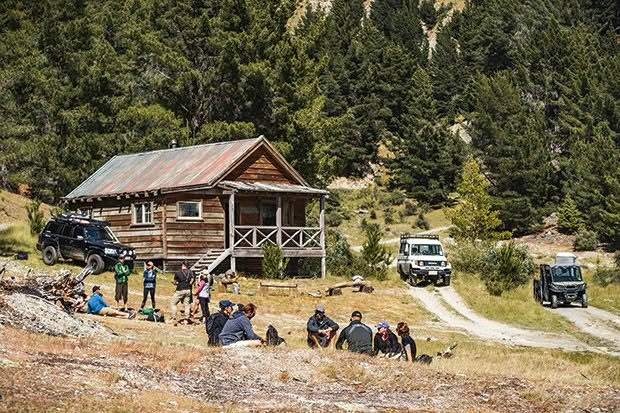
A Logan Lore course underway at Queenstown Hill.
After Ben had been seizure-free for several years, the couple decided to take what he had learned about nutrition, human biochemistry and psychology. The plan was to combine that knowledge with their love for — and comfort in — the great outdoors and offer bespoke programmes to help others get their life sorted.
“We create individual courses for companies, or families, a bit like a personal Outward Bound, finding unique ways to help people achieve dynamic, healthier, stronger and more resilient lives.”
The couple’s business, called Logan Lore, is based on the belief that many facets of the regime Ben put himself through to deal with his epilepsy can help anyone develop new positive behaviours. These included following a ketogenic diet (which forces the body to burn fats rather than carbohydrates) and cold water immersion (thermogenesis).
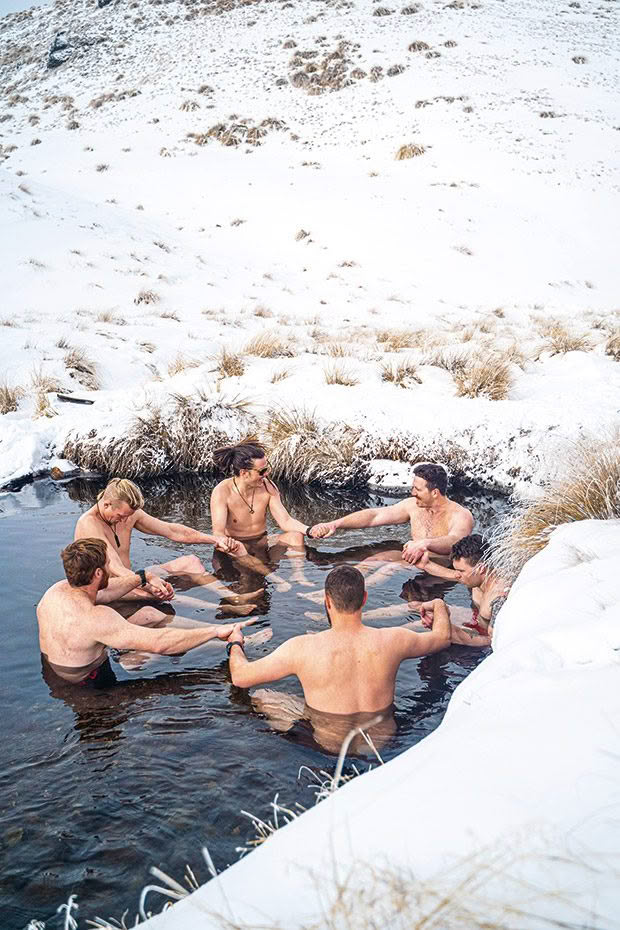
Participants undergoing a voluntary (“I don’t hold a gun to anyone’s head”) cold water immersion session at the Snow Farm in the Cardrona Valley.
“These practices essentially use biochemistry to cause the body to react, and there are a lot of transferable benefits. The theory is that the body likes stress as humans have evolved for a hundred thousand years with stress. These days, stress is considered a bad thing; bad relationships, jobs you hate, a dead-end life, leading to harmful coping mechanisms such as smoking, drugs and alcohol overuse.
Traditionally, our species’ stress was physical hardship, exposure to cold and going without food. The body needs stress to strengthen, repair, grow and develop. We have it far too good. The perception that everything has to be nice, comfortable and safe does not serve us mentally, physically or health-wise at all.”
That does not mean that he puts his clients through outback hardship unless they wish it. They can choose sleeping bags on the ground, or tents, glamping sites or even luxury accommodation. Thermogenesis (cold water immersion) is optional, but good food isn’t.
“We take great food, but it is up to the client how we eat it. I can show them a beautiful tomahawk steak and say: ‘Well, we can eat this raw or you can make a fire and cook it. Up to you.’ “We work in the outdoors among the mountains because it is a beautiful, healthy and a conscious place in which to develop people’s health and wellness.”
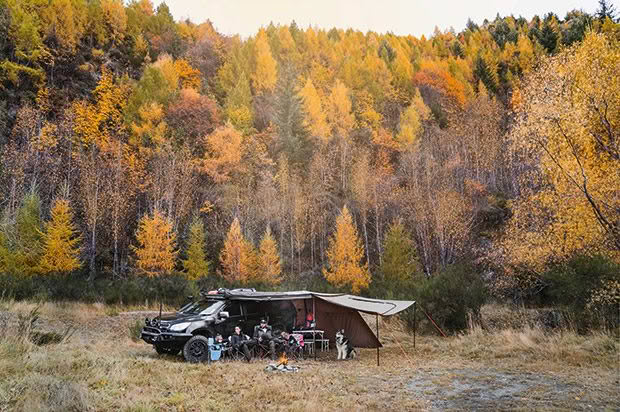
The awning tent, with clip-on sides, attaches to the couple’s 4WD and is quick and easy to erect if they want to give the children a run-around while protected from wind or rain. Their alaskan malamute dog, Maska, is bred to pull sledges in the snow. But, as he is a pet, Maksa enjoys the outdoors without needing to work for his supper.
It is one thing, however, to have an idea about a business but, as Ben and Bel have found, it is quite another to make it a success; and Ben is the first to admit that marketing is not his strength. Bel’s photography and films, showing potential clients what they might experience on a course, helped the business grow alongside the growth of their own family.
The couple has two children, daughter Zahara (4) and son Archer Wolf (2). With Ben seizure-free for five years and corporates and individuals arriving from the United States and Australia, in addition to interest from local families and companies, the future looked promising. Then came Covid-19. But in the way of so many small enterprises, the pause was put to good use refining the business’ marketing material and defining the structure of its courses.
“We started with mainly men’s health courses, as well as corporate leadership training using traditional bushcraft skills. Now, our more modern approach is to prepare people for life with customized programmes. It could be health and wellness, building a team with a focus on leadership, creating company culture, developing communication skills. Or it may involve pure survival training and tailored-outcome courses, such as preparing for an earthquake, or basic preparedness training for taking your family into the outdoors.
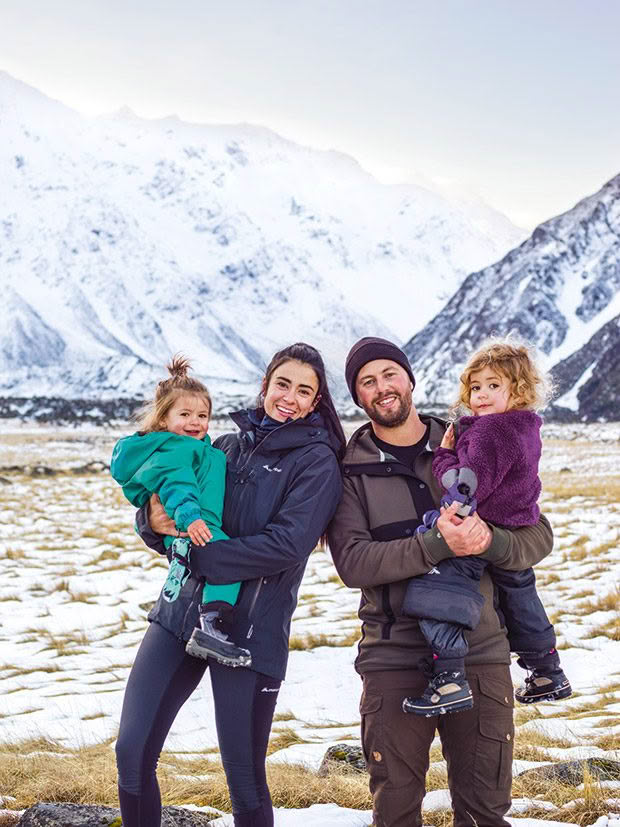
Ben and his wife Bel Jones and their toddlers Archer Wolf (in Bel’s arms) and Zahara (in Ben’s) head into the wild once every week for a night under the stars.
“When people are out of their immediate environments and going through hardship suited to their level, it illuminates essential fundamentals. The interpersonal relationships of a family, a father and son team, or a company are based on communication skills, letting go of the ego and being prepared to ask for help. The skills needed to survive in the unfamiliar circumstances of the mountains are highly transferable to everyday life. The goal is to give people the ability to take back the skills to their family or company life.
“As a species, we are not that different from where we were many millennia ago. We still need a connection to like-minded people — and more than just on a Facebook level — and we need to know that our lives have a purpose. Family is key to providing a common purpose in life. Family, or your tribe, is where we share highs and lows that give life meaning.”
Bel is particularly concerned about the shallowness of modern communication and how easily it can provide a distorted view of life. “I am wary of the outward image that may show us as a family with everything handed to us on a platter. That Ben is who he is today because he had a great upbringing.
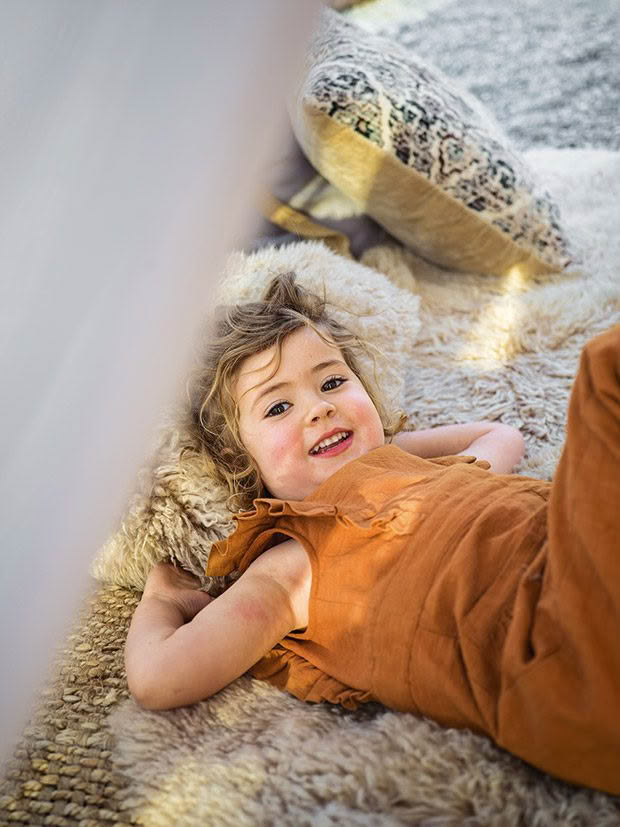
“But that’s not the case. Sure, he has two beautiful kids and a wife and dog and lives in Wānaka and has this amazing business. But he has worked hard to get here. I am careful about our social media not showing our lives in a bullshit way; that everything is perfect all the time. Because it isn’t. We go into the outdoors every week as a family, and it would be so easy to show this idyllic life without dirty nappies and toddler tantrums. Life isn’t like that.
“Ben has not elaborated on his upbring before, and I think it is important for others to know that he has worked hard on himself to be the person he is. And that others can do it too. It is particularly important for men who may never have shared their struggles before to know that he didn’t land in life this way, but he has been on a trajectory to get here.”
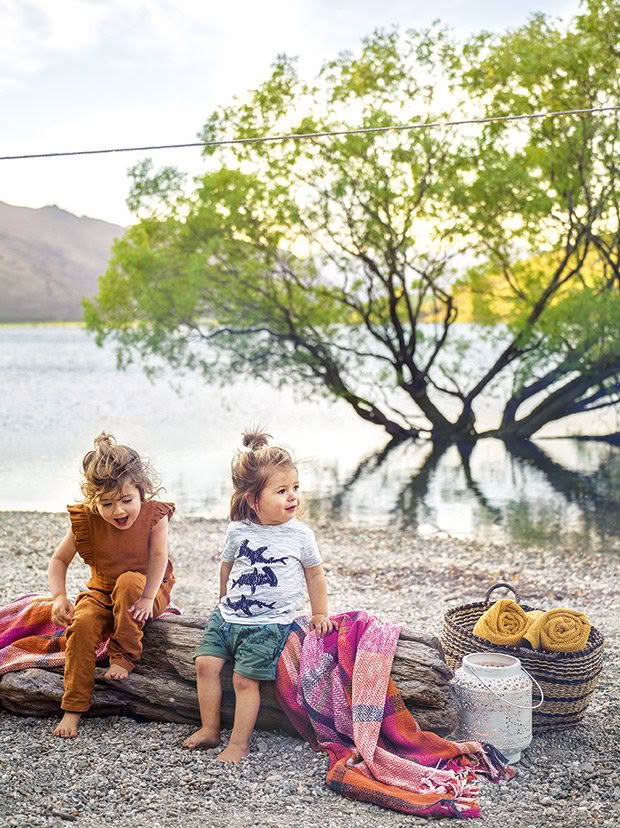
Ben’s motivation may have been initially to be the best version of himself and then to overcome epilepsy without drugs, but his higher purpose now is to share what he learned with others.
“Reconnecting people with the fundamentals needed for life provides them with strategies to implement in the everyday; finding the purpose of their life is the most important thing. Motivation is easy — it is a biochemical reaction that lasts for a period — but knowing life’s purpose gets you up in the morning and consistently prepared to go through hardship for a result.
“My job is to provide experiences that connect people with behaviours, mindsets and philosophies that allow them to be their best. And my overall purpose in life is to be the best father and husband I can and to teach my children these skills, so they don’t walk blindly through life as I did for years.”
BEL’S TIPS FOR OUTDOOR EXPERIENCES WITH TODDLERS
1. Leave the expectations at home as something is bound to go askew. Thinking everything will run smoothly is asking for disappointment so best enjoy the moment and find humour in chaos.
2. Take lots of snacks — children need them.
3. Pack wet weather gear even if the forecast is good. Weather is unpredictable, and it’s always much better to have warm and dry kit that’s unused rather than being caught in the rain (literally).
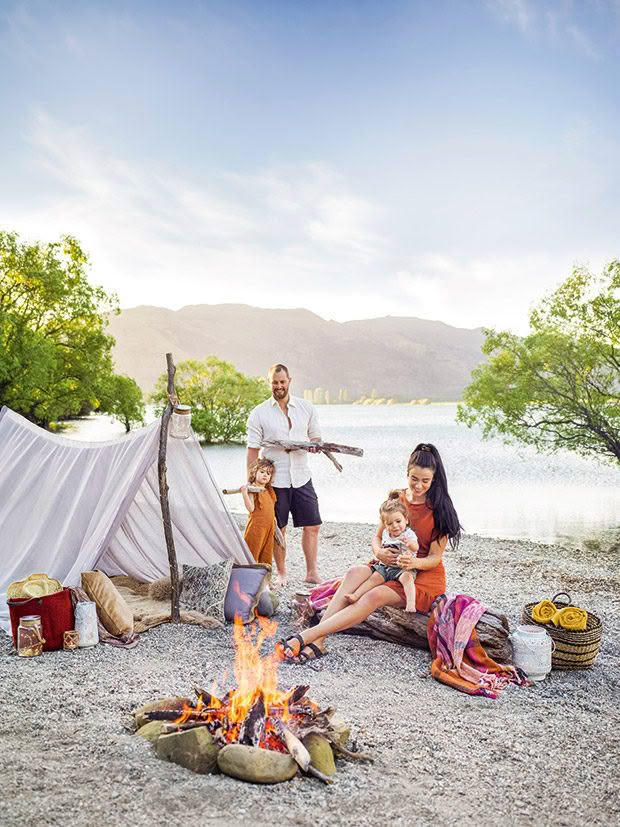
An outdoors experience can be as simple as an evening beside an outdoor fire in a sheltered area (here, Lake Wānaka’s Dublin Bay) where the children enjoy playing in a makeshift pole tent of sheets and sheepskins.
4. This one may not sit well with everyone, but don’t be afraid to utilize devices, especially on a long drive. Yes, the whole idea of going camping is to get back to nature, but it doesn’t mean enduring a hellish multi-hour car trip.
5. Take photos but also enjoy the moment. I sometimes struggle with trying to balance that as it’s in my nature to want to record the beautiful scenes with my kids in them. Best enjoy the process of capturing the moment and then put your phone/camera away and immerse yourself in it, too.
6. Pack favourite books and snuggly soft toys.
7. Take hot water bottles for chilly nights.
8. Learn about the local fauna/flora so that you can spot them with your little ones and teach them something new. Pointing out the constellations and planets at night is fun. SkySafari is a wonderfully informative app about the stars and planets.
BEN ON COLD WATER IMMERSION
What is it? “Immersing the body in water below 15 degrees Celsius for more than 10 minutes.”
Why? “It builds resilience, mental strength and is thought to provide the body with health benefits such as improved circulation, cardiovascular health, reduced inflammation, improved mental health and mitochondrial biogenesis. The theory is that a certain degree of hardship stimulates the body’s repair mechanisms.”
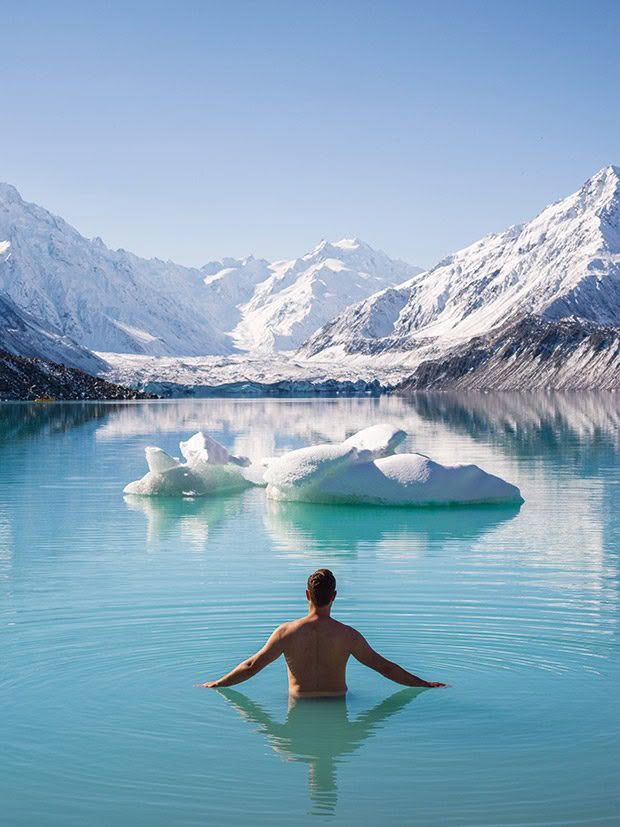
Ben Logan estimates the temperature of Tasman Glacier Lake in Aoraki/Mount Cook National Park is one to two degrees Celsius as he submerges up to his neck for 10 minutes among the icebergs. “The stones underfoot are sharp in this lake, and the cold water causes pains in the feet, so you have to get your head in the right space from the beginning.”
Getting started? “You wouldn’t train for a marathon with a 42 kilometre run so start slowly by turning the water to lukewarm or cold for the final minutes of a morning shower. Then take the challenge of turning it colder for longer. Your body will adapt — it is like all physical training.”
How does it feel? “Endorphins kick in and release biochemicals, so the feeling afterwards is invigorating. Importantly, it acknowledges mental strength and self-discipline that can be applied to all aspects of life.” loganlore.co.nz
Love this story? Subscribe now!
 This article first appeared in NZ Life & Leisure Magazine.
This article first appeared in NZ Life & Leisure Magazine.
